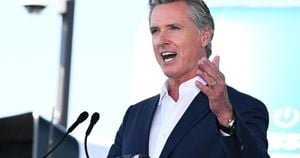Manchester United fans are gearing up for protests against the club following their controversial decision to hike ticket prices mid-season. The recent announcement revealed the cost of matchday tickets will rise to £66 each, without any discounts for children or pensioners, angering the club's loyal supporters.
The fee increase aligns with the recent shake-up within the club, sparked by managerial changes and financial pressures. Reports indicate the cost of terminating former manager Erik ten Hag's contract and bringing Ruben Amorim on board has topped £20 million, which adds to the financial strain on the club.
Fans expressed their outrage through the 1958 fan group, which has previously organized protests against the Glazers' ownership of the club. They labeled the ticket price hike as "clear exploitation" and are planning joint demonstrations with Everton supporters during the upcoming match on Sunday at Old Trafford.
United communicated the price changes through their website and during meetings with their fans' forum, stating the increase will only affect around 3% of ticket buyers, as the majority of tickets have already been sold. This argument, though, has not placated the angry fans, who feel they are being taken advantage of.
The 1958 group's open letter to chief executive Omar Berrada voiced their strong disapproval, calling the club's actions unacceptable. They pointed to the club's policy of allowing season ticket holders to sell back their tickets for resale at higher prices, dubbing such practices as "corporate touting."
The Manchester United Supporters' Trust (MUST) has also denounced the increase as offensive, especially since it was enacted without prior consultation with the fans. They criticized the move as part of broader financial mismanagement, insisting the decision was made hastily and without considering the community of supporters who have stood by the club through thick and thin.
“We have objected to this action in the strongest possible terms,” stated MUST representatives, emphasizing their intention to secure urgent discussions with the club to voice their grievances. They are worried about the long-term ramifications of such decisive pricing policies on the club's relationship with its fanbase.
According to club officials, the ticket price adjustments are part of the effort to comply with the Premier League's financial sustainability regulations. They argue it’s necessary to generate increased revenues to invest back in the team, particularly to build up Amorim's squad to perform competitively on the pitch.
The fan backlash is also set against the backdrop of the recent Premier League financial figures, which showed United struggling both on and off the field. After suffering through poor performance under Ten Hag, which resulted in his dismissal, the club’s form landed them on the bottom half of the playoff standings.
Despite the mounting ticket prices across the league—mirroring trends at many other Premier League clubs—United fans’ frustration is palpable. The Football Supporters' Association is also involved, launching the '#StopExploitingLoyalty' campaign, highlighting the growing discontent among football fans nationwide.
Concerns over ticket prices reflect broader worries about maintaining football's traditional relationship with its supporters. Many feel the recent financial trends signal not just the commercial exploitation of fan loyalty, but also jeopardize the community and culture surrounding the sport. The loss of affordable access to matchdays could alienate long-standing fans who have devoted years supporting their teams.
With the protests scheduled to coincide with the Everton match at Old Trafford, players and management will undoubtedly feel the weight of the fans' dissatisfaction when they step onto the pitch. The 1958 group, along with alliances with other supporter groups, aim to demonstrate the widespread discontent with what they see as misguided financial priorities by the club's leadership.
For Manchester United, these protests are not just another day of fan unrest. They represent a confluence of managerial missteps, financial consequences of high-stakes decisions, and the palpable frustration of supporters who have watched their club’s legacy dwindle. The message is clear: The fans are prepared to fight for their club's integrity and promise to hold those at the top accountable for their choices.
Whether the club responds to this tide of sentiment remains to be seen, but one thing is certain: Manchester United’s most passionate supporters expect to be heard—and they are ready to make their voices loud and clear.



